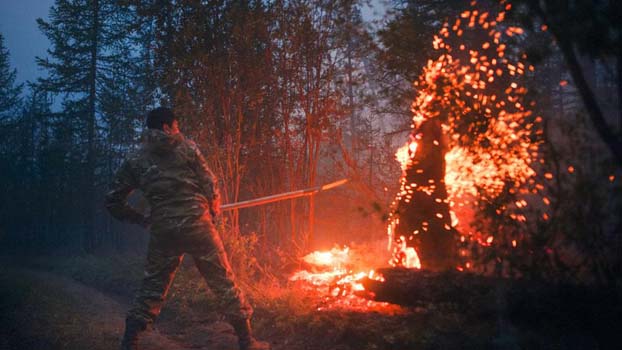Volunteers pitch in to fight Russia’s raging forest fires


AP, Gorny Ulus
The little domed tents of the volunteer firefighters in the clearing of a Siberian forest can be hard to see — even from only a few steps away — because of the choking smoke. Their shovels and saws seem to be tiny tools against the vast blaze, like toy weapons brought to a war.
But their love of the vast and wild region is a powerful motivator in a summer of sprawling fires that might become Russia’s worst ever.
As of Monday, about 1.88 million hectares (4.6 million acres) of forest were burning in Russia — an area larger than the US state of Connecticut.
More than 5,000 regular firefighters are involved, but the scale is so large and the area is so enormous that 55% of the fires aren’t being fought at all, according to Avialesookhrana, the agency that oversees the effort.
That means the volunteers, who take time off work and rely on their own money or nongovernmental funds, are a small but important addition to the overwhelmed forces.
“The guys (volunteers) are doing a great job. Their help is significant because the area and distances are quite large, so the more people there are, the more effective our efforts are to control the fires,” said Denis Markov, an instructor at a base for paratrooper firefighters in Tomsk, who is working with some of the volunteers.
The hardest hit area is the Sakha Republic, also known as Yakutia, in the far northeast of Russia, about 5,000 kilometers (3,200 miles) from Moscow. About 85% of all of Russia’s fires are in the republic, and heavy smoke forced a temporary closure of the airport in the regional capital, Yakutsk, a city of about 280,000 people. As the smoke intensified, Ivan Nikiforov took a leave from his office job in the city — not to escape the bad air but to head into the fires as a volunteer.
“I think it’s important to participate as a volunteer because our republic, our shared land and our forests are burning. This is what we’ll be leaving for our children and our grandchildren,” he said at his group’s encampment in the Gorny Ulus area west of Yakutsk. Nikiforov and a small contingent of other volunteers firebreak trenches, chop down trees and set small controlled fires to try to block the spread.
Volunteers in the area received some support from the nongovernmental agency Sinet-Spark, which provided sleeping bags, gloves and heavy equipment. Alexandra Kozulina, the group’s director of projects, said Sinet-Spark initially had planned to spend its money on information campaigns but decided to provide equipment as the fires worsened.
“I also believe our government should be doing this. I don’t understand why it isn’t happening — whether there isn’t enough money because budgets were cut, or some other reason, but we are doing what is in our power,” she said.
The main problem, many observers say, is that the size of the aerial forest protection agency has been reduced, along with the number of rangers.
“I can personally remember how each district had a branch of Avialesookhrana with 15-20 paratroopers. They constantly made observation flights and put out fires as soon as they started,” said Fedot Tumusov, a member of the Russian parliament from Sakha.



